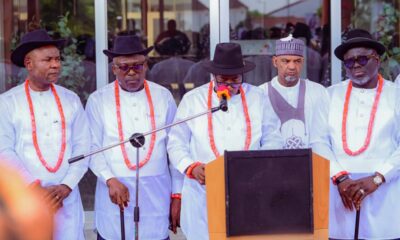News
Our Victory Seen On INEC Server, Genuine, Atiku Tells Tribunal
The presidential candidate of the Peoples Democratic Party (PDP), Alhaji Atiku Abubakar, and the party have told the Presidential Election Petitions Tribunal in Abuja that their victory as shown in the results from the Independent National Electoral Commission (INEC) server were not concocted.
Atiku and PDP were replying to the spokesman of the APC candidate, President Muhammadu Buhari, Festus Keyamo (SAN), who had described Atiku’s claim to have scored the highest votes in the February 23, 2019, presidential election based on results from the INEC server as false.
Keyamo had added that the APC had petitioned the Inspector- General of Police and the Director-General of the Department of State Services (DSS) against Atiku for “breaking or hacking into the 1st Respondent’s (INEC) server to obtain the said scores and votes.”
Replying through his team of lawyers at the tribunal led by Levi Uzoukwu (SAN), Atiku stated that the results it claimed to have obtained from the INEC server were “neither false nor contrived or concocted.
“Indeed, the ad-hoc staff and officials of the 1st Respondent (INEC) in obedience to the training/instruction by the 1st Respondent transmitted the scores they got from the polling units to the 1st Respondent’s server.”
Atiku listed 13 ad-hoc staff of INEC who all testified that they, indeed, uploaded results from polling units to the INEC server as instructed during their training.
An ad-hoc staff, who claimed to have worked as a presiding officer (APO1) at the Federal Polytechnic, Damaturu, Yobe State, at Central Primary School, Nangere Unit with Code 011, of Dawasa-Nangere, said he followed the instruction.
He said, “At the close of voting, I transmitted the result electronically to the 1st Respondent’s server using the Smart Card Reader (SCR) and the code provided by the 1st Respondent.”
INEC had announced President Buhari winner of the election with 15,191,847 votes with Atiku polling 11,262,978 votes.
However, Atiku claimed that results from the INEC server showed that he scored a total of 18,356,732 as against 16,741,430 votes for Buhari.
Meanwhile, the Peoples Democratic Party (PDP) says the Presidency’s jittery reaction to the media interview granted by a top official of the Independent National Electoral Commission (INEC), confirming the existence of a central election results transmission server in the commission, further exposes its nervousness, as the guilty was always afraid.
The PDP said that the interview, which has already gone viral, speaks volumes about the reported denial by INEC of the existence of such a server for the 2019 general election as well as the frenzy by President Muhammadu Buhari’s team to distract the Presidential election petitions tribunal by externalising its proceedings.
A statement by the party’s spokesman, Kola Ologbondiyan said, “This is in addition to the Presidency’s feverish attempt to divert public attention by engaging in judicial interpretations and hauling insults on our party and candidate, Atiku Abubakar, over our determination to retrieve our stolen mandate in the court.
“The lesson for all in the latest episode is in the undying verity that no matter how long falsehood appears to thrive, the truth will always come to light and prevail at the end of the day.
“Instead of this pitiable resort to frenetic and chaotic play to the gallery, the PDP counsels President Buhari and his team to focus on facing the course of justice at the tribunal.”
“The PDP further advises President Buhari and his team to curtail their desperation and respect the sanctity and integrity of the Court of Appeal by ending their externalization of proceedings, which has been their calculated scheme to distract the court and derail the course of Justice.
“The PDP and our candidate, Atiku Abubakar, are full of respect for the court and will never join President Buhari’s team in engaging in actions that tend to undermine independence and sanctity of the judiciary.
“Our party stands firmly with Nigerians in our determination to retrieve our stolen mandate in the court and no amount of shenanigans by the APC and the Buhari team will distract us or detract from the resolve of Nigerians in their expectation of the triumph of their will at the tribunal,” the statement added.
News
Fubara Attends PDPGF Meeting In Asaba …..Back Court Verdict On National Secretary Position

Rivers State Governor, Sir Siminalayi Fubara, last Friday, attended the Peoples Democratic Party Governors’ Forum (PDP-GF) meeting in Asaba, the Delta State capital.
The Rivers State Governor, who is the Vice Chairman of the PDP Governors’ Forum, attended the meeting, alongside 10 other Governors of the party’s controlled states across the six geopolitical zones of the country.
The first PDPGF meeting in 2025, was held at the Government House in Asaba, at the end of which a seven-point resolution was reached.
Reading the communique at the end of the meeting, the Chairman of the Forum, and Governor of Bauchi State, Senator Bala Mohammed urged the National Working Committee (NWC) to put every machinery in place to ensure a hitch-free NEC meeting on March 13, 2025.
The communique stated:
“The Forum, having examined all the notices required by law to be given to validly convoke NEC, advised NWC to reschedule NEC to the thirteenth (13Th) of March 2025.”
The Forum further noted the Court of Appeal judgment affirming Udeh Okoye as the National Secretary of the party, saying that as a party that believes in the rule of law, it will respect the position of the Appellate Court on the matter.
“The Forum noted with delight the ongoing efforts at resolving the crisis in the National Working Committee, NWC, on the position of the National Secretary, and has reaffirmed its support for the Court of Appeal judgment; consequently, the Forum advised the NWC to set up the machinery for the effective implementation of the court judgment.
“While commending the country’s valiant and patriotic Armed Forces and Security Agencies for maintaining the frontline in securing the country and the gains of our gallant personnel against bandits in parts of the country, the Forum viewed with deep concern, the resurgence of brazen non-state actors. It, therefore, calls for the strengthening of the nation’s security architecture.”
Governors in attendance include: H.E Senator Bala Abdulkadir Mohammed (Bauchi State); H.E Sir Siminalayi Fubara (Rivers State) – Vice Chairman; H.E Rt. Hon. Sheriff Oborevwori (Delta State) – Host; H.E Dr. Agbu Kefas (Taraba State); H.E Rt. Hon. Ahmadu Umaru Fintiri (Adamawa State); and H.E Dr. Dauda Lawal (Zamfara State).
Others are H.E Senator Ademola Adeleke (Osun State); H.E Senator Douye Diri (Bayelsa State); H.E Pastor Umo Eno Ph.D (Akwa Ibom State); H.E Dr. Peter Mbah (Enugu State); H.E Barr. Caleb Mutfwang (Plateau State);
and H.E Bayo Lawal (Deputy Governor, Oyo State), who represented Governor Seyi Makinde.
News
NGO Implants Free Pacemakers Into 22 Cardiac Patients In PH
A United States based Non Governmental Organisation, Cardiovascular Education Forum, in collaboration with the University of Port Harcourt Teaching Hospital (UPTH), has successfully implanted free pacemakers into 22 patients with different cardiac cases in Port Harcourt.
This is in a bid to save lives and encourage patients with low heartbeats to live longer.
The implantable device, which costs $20,000 each, was inserted free of charge on the selected patients.
Speaking during a Special Hospital Ground Rounds at the UPTH with its Theme, “Recent Advances in Cardiac Pacing,” a cardiac Physiologist, Dr Neil Grub, said the NGO was in Nigeria to improve training and learning on cardiac issues and help patients with cardiac problems.
Accompanied by a team of experts comprising a cardiologist and cardiac device implanter, Dr Jagdeep Siagh, and UPTH interventional cardiologist, Dr Edafe Emmanuel, Dr Grubb said pacemakers were inserted on patients with low heartbeats to boost their heart rates.
Earlier, the Chief Medical Director, UPTH, Prof Henry Arinze Ugboma, said each of the implantable devices cost over $20,000.
Ugboma, represented by the Chairman, Medical Advisory Committee, UPTH, Prof Datonye Alasia, said the partnership between UPTH and the foreign NGO was to build networks, and improve services in terms of healthcare delivery, training and learning.
According to him, there is now a ray of hope in terms of treatment of patients with cardiovascular cases in the hospital.
He said the UPTH started the collaboration with Cardiovascular Education Forum in 2018 to boost health, training and learning on cardiac health.
He assured that, “in coming years, the scale of our collaboration with the mission will be higher.”
Chinedu Wosu
News
FG Unveils National Broadband Alliance To Drive Internet Access
The Federal Government has unveiled the National Broadband Alliance, a new initiative aimed at transforming the nation’s digital infrastructure and boosting connectivity across the country.
The initiative was unveiled yesterday in Lagos by the Minister of Communications, Innovation, and Digital Economy, Bosun Tijani, who was represented by the Executive Vice Chairman of the Nigerian Communications Commission, Aminu Maida.
In his address, Tijani stated that NBAN would significantly enhance broadband penetration, which has grown from just six per cent in 2015 to approximately 42 per cent as of October 2024.
To support this agenda, he said the government was leveraging a Special Purpose Vehicle to deploy 90,000 km of fibre backbone across the nation, connecting underserved and rural communities to high-speed internet.
According to him, the initiative aligns with the Renewed Hope Agenda of President Bola Ahmed Tinubu, which prioritises innovation, technology, and collaboration as key drivers of national prosperity.
Tijani stated that the expansion would not only improve access to reliable broadband but also empower Nigerians, particularly in rural areas.
“While the progress made in broadband penetration is commendable, we recognise that much more needs to be done to ensure every Nigerian can enjoy the benefits of reliable, high-speed internet,” Tijani said.
The minister also emphasised the importance of strategic partnerships with donors, investors, and other key stakeholders in achieving the goals set out in the National Broadband Plan (2020–2025).
He said these collaborations would be essential in overcoming infrastructure development challenges and making broadband affordable and accessible for all Nigerians.
“These targets reflect our unwavering commitment to ensuring that broadband is accessible, affordable, and inclusive for all Nigerians. However, we are also aware of the challenges ahead,” he added.
Tijani stressed that achieving the government’s targets—70 per cent broadband penetration by 2025, a minimum internet speed of 25 Mbps in urban areas, and broadband access for 80 per cent of the population by 2027—will require sustained efforts.
“Achieving these goals will require more than just the efforts of the private sector. It will require a holistic approach that includes strategic partnerships with donors, investors, and other key stakeholders in accelerating the rollout of critical infrastructure,” he said.
-
Rivers1 hour ago
Police Confirm Vehicle Insurance Policy Enforcement In Rivers
-
Business55 mins ago
Oil Production Resumption: Ogoni Youths Seek Inclusion In FG’s Plans
-

 News3 hours ago
News3 hours agoSenate Reshuffles Committees, Appoints New Chairmen For Dev Commissions
-

 Nation40 mins ago
Nation40 mins agoBizman Alleges Threat To Life …Seeks Police ,Govt’s Intervention
-
Rivers1 hour ago
NOSDRA D-G Disburses N150m To 300 Farmers In Rivers
-
Business54 mins ago
NCDMB Assures Greater Local Industry Participation In Oil, Gas Projects
-

 News3 hours ago
News3 hours agoNigeria Strengthens Economic Ties With Germany To Boost Investment, Jobs
-

 Featured14 mins ago
Featured14 mins agoFubara Flags Off Upgrading Of 135 Primary Healthcare Facilities In Rivers

